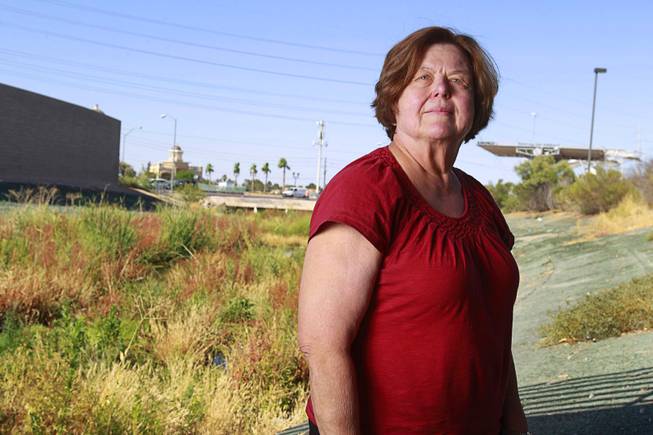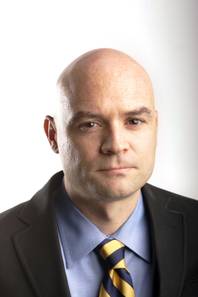
Nancy Menzel is a board member at the Southern Nevada Health District and an associate professor of nursing at UNLV. Seen here in a flood control wash near Flamingo Road and Swenson Street, where health district officials have seen homeless people, Menzel says she’s frustrated with the district’s struggle to stay on top of public health problems.
Sunday, June 17, 2012 | 2 a.m.
View more of the Sun's opinion section

J. Patrick Coolican
Sun coverage
Nancy Menzel, a professor of nursing at UNLV, is leaving the Southern Nevada District Board of Health in frustration after just one term.
The board — made up of a mix of appointed experts and elected officials from various jurisdictions — is supposed to set policy for the Southern Nevada Health District, which is the agency charged with confronting the valley’s significant public health challenges.
Menzel describes a dysfunctional board burdened by conflict with Clark County while public health problems fester.
In just the latest sign of adversity for the board, Dr. Lawrence Sands, the chief medical officer of the health district, resigned last week.
Menzel is supportive of the district but was scathing in her critique of its board.
“It’s been a very discouraging tenure,” she said, adding that the board suffered from a lack of expertise in public health issues. “We don’t seem to elect the finest public servants.”
The health district, which is funded by property taxes, is in litigation with Clark County over control of its budget and whether it can own its own buildings. It vacated its main headquarters in April over structural concerns about the building.
The district’s administration has been justly criticized for allowing high salaries and authorizing raises during the recession. More than 150 employees — holding jobs generally requiring specific skills and advanced education — earned pay and benefits of at least $100,000 in 2011, according to TransparentNevada.
“In the two years I have been on the board,” Menzel said in an email, “we have enacted exactly one health policy. It affirmed the board’s stance against teenage pregnancy. This isn’t much of an accomplishment. Instead, we have frittered away our time on minutia ...”
Menzel decried the state of public health in Southern Nevada, noting a string of depressing statistics, with Clark County worse off compared with the national median in too many categories to count: self-reported “poor or fair health,” poor mental health, low birth weight, adult smoking, excessive drinking, sexually transmitted infections, teen birth rate, uninsured, primary care physicians, violent crime, air pollution, and access to parks and recreation.
We have one of the lowest rates of childhood immunization in the nation, and one-third of Clark County School District kindergartners are overweight.
Menzel said we should separate the board’s troubled internecine politics from the work of the health district staff, which “is filled with professionals who do the best they can to protect public health” with limited resources.
Consider its $71 million budget, which is about a third of the amount spent by the public health agency in Seattle-King County — which is roughly equal in size — according to Dr. John Middaugh, director of community health. We also have half the staff of Seattle.
The job is enormous. The district tracks the outbreak of communicable diseases, food-borne illnesses, and air and water quality; prepares for disasters and epidemics; and tackles problems such as smoking and obesity, among many other tasks.
Bonnie Sorenson is the district’s director of nursing and clinical services and a public health professional of 39 years, including 10 in Nevada. She said the district is “concentrating our efforts where we know we have the highest burden of disease, but that doesn’t mean we don’t have disease everywhere else.”
She cited two areas where the district hopes innovative programs will address pressing problems.
In one program, a nurse is assigned to young expectant mothers who are at risk given their history with the criminal justice system, substance abuse or lack of educational attainment. Thus far, 96 percent have delivered healthy, full-term babies, and 96 percent are breast feeding. The nurses continue to work with the mothers until the children are 2 years old, a key period of development. Plenty of evidence now suggests childhood trauma leads to a range of health and behavioral problems later, so early intervention is absolutely crucial. The program only serves 100 mothers and has a waiting list, which is a shame because it could potentially save taxpayers millions in later prison costs.
The district also won a grant to attack teenage pregnancy by focusing on at-risk boys, who are often oblivious about the rudiments of human biology. Our teen pregnancy rate, consistently one of the highest in the nation, costs Nevada perhaps as much as $100 million per year, Sorenson said.
It’s good to hear about these programs, but we’re pushing a boulder up a desert hillside. There’s no getting around it: We’re an unhealthy town. I don’t mean to be a school marm, and much of this is perfectly understandable. We’re the nation’s party capital, a 24-7 city requiring a lot of high-stress service jobs. It’s unpleasant to walk in most areas of the valley, given how the city is laid out. The past few years have been stressful, with layoffs, foreclosures and bankruptcies, and stress is deeply damaging to the mind and body. Finally, many of us were attracted to the region’s live-and-let-live attitude — no bans on big sodas here — which allows us to live as we please.
What’s the cliche? At least you have your health? We don’t even have that.
Even if you and I are healthy, however, public health issues are not without consequence. Health problems are economic problems for all of us. Treating the sick is expensive. Sick workers are less productive workers. Sick parents are less attentive parents, which means their kids don’t perform as well in school. Moreover, some recent evidence indicates that you’re not an island, that health habits (and unhealthy habits) such as obesity and smoking are contagious across three degrees of separation, meaning your obesity affects eating and exercise habits of people you know and the people they know.
These are important and complex issues. Menzel’s departure from the health board is a loss.

Join the Discussion:
Check this out for a full explanation of our conversion to the LiveFyre commenting system and instructions on how to sign up for an account.
Full comments policy